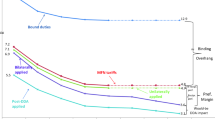Abstract
Since the seventies the existing order of international economic relations has been exposed to ever stronger pressures. Access to foreign markets must once again be regarded as a scarce commodity, since the far-reaching removal of tariff barriers has been more than compensated for by non-tariff restrictions.
Similar content being viewed by others
References
On the politization of the problems cf., e. g., the study by H. Maull: Europe and the World Energy, London 1980, passim.
K. W. Rothschild: Außenhandelstheorie, Außenhandelspolitik und Anpassungsdruck (Foreign trade theory, foreign trade policy and the pressure for adjustments), in: Kyklos, Vol. 32 (1979), p. 57 f. B. Gahlen uses a similar argument in a different context: “It may seem paradoxical but if we insist on a pure market solution, we end up with an interventionism which is not wanted by anybody.” B. Gahlen: Strukturpolitik und Soziale Marktwirtschaft (Structural policy and social market economy), paper read at the plenary session of Verein für Socialpolitik in Nuremberg on Sept. 15–17, 1980, quoted from IIM/dp 80-44, WZB, Berlin 1980, p. 6.
Cf., for details, E. Minx: Von der Liberalisierungs- zur Wettbewerbspolitik. Internationale Wirtschaftspolitik zwischen Industrieländern nach dem Zweiten Weltkrieg (From liberalization policy to competition policy. International economic policy between industrialized countries after the second world war), Berlin, New York 1980, Chapters I, III and IV.
Cf., e. g., G. Curzon, V. Curzon: The Management of Trade Problems in the GATT, in: A. Shonfield (ed): International Economic Relations of the Western World 1969–1971, Vol. 1, Politics and Trade, London, New York, Toronto 1976, p. 194.
Cf. J. Pinder: Positive Integration and Negative Integration: Some Problems of Economic Union in the EEC, in: World Today, Vol. 24 (1968), p. 88 ff.
Cf., e. g., A. Shonfield: International Economic Relations of the Western World: An Overal View, in: A. Shonfield (ed.), op. cit., International Economic Relations of the Western World 1969–1971, Vol. 1, Politics and Trade, London, New York, Toronto 1976, p. 194. Chapter II.
Cf. on this point M. M. Postan: An Economic History of Western Europe 1945–1964, London 1967; J. Cornwall: Modern Capitalism. Its Growth and Transformation, London 1977.
Cf. H. G. Grubel, P. J. Lloyd: Intra-Industry Trade, London 1975, Chapters 8–10; G. C. Hufbauer, J. G. Chilas: Spezialisierung von Industrieländern. Umfang und Auswirkungen (Specialization of industrialized countries. Its extent and effects), in: Probleme der weltwirtschaftlichen Arbeitsteilung, Schriften des Vereins für Socialpolitik, New Sequence, Vol. 78, Berlin 1974, p. 10 f. and 14 f.
Cf. G. C. Hufbauer, J. P. Chilas, ibid., Spezialisierung von Industrieländern. Umfang und Auswirkungen (Specialization of industrialized countries. Its extent and effects), in: Probleme der weltwirtschaftlichen Arbeitsteilung, Schriften des Vereins für Socialpolitik, New Sequence, Vol. 78, Berlin 1974, p. 7.
A. Predöhl: Probleme und Phasen der Kennedy-Runde (Problems and phases of the Kennedy round), Hamburg 1966, p. 16.
Cf. A. Lindbeck: Economic Dependence and Interdependence in the Industrialized World, Stockholm 1977; and also B. Fritsch: Die Überforderung des Staates (Excessive demands on the state), IIVG Papers, PV/78-24, WZB, Berlin 1978.
R. N. Cooper: Trade Policy in Foreign Policy, in: R. N. Cooper (ed.): A Reordered World Emerging International Economic Problems, Washington 1973, p. 46 ff.
J. Pelkmans: Economic Cooperation among Western Countries, in: R. J. Gordon, J. Pelkmans (eds.): Challenges to Interdependent Economies, New York 1980, p. 75 ff.
Cf. W. Hager: Wirtschaftspolitik und Allianzdiplomatie (Economic policy and alliance diplomacy), in: M. Gräfin Dönhoff, K. Kaiser et al. (eds.): Die Internationale Politik 1970–1972, Munich and Vienna 1978, p. 86.
W. Hager: Westeuropas wirtschaftliche Sicherheit (The economic security of Western Europe), Arbeitspapiere zur Internationalen Politik, No. 6, Bonn 1976, p. 16.
Ch. P. Kindleberger: Optimal Economic Interdependence, in: Ch. P. Kindleberger, A. Shonfield (eds.): North American and Western European Economic Policies, London 1971, p. 502.
Concerning the so-called “positive” policy cf. also the mentioned study by J. Pelkmans, op. cit., Economic Cooperation among Western Countries, in: R. J. Gordon, J. Pelkmans (eds.): Challenges to Interdependent Economies, New York 1980, p. 115 ff; cf. also B. Gahlen, op. cit. Strukturpolitik und Soziale Marktwirtschaft (Structural policy and social market economy), paper read at the plenary session of Verein für Socialpolitik in Nuremberg on Sept. 15–17, 1980, quoted from IIM/dp 80-44, WZB, Berlin 1980, p. 6.
Cf. K. Stegemann: Wettbewerb und Harmonisierung im Gemeinsamen Markt (Competition and harmonization in the Common Market), Cologne, Berlin, Bonn 1966.
Cf. E. H. Preeg: Economic Blocs and U. S. Foreign Policy, Washington 1974, p. 185 ff; H.-G. Voigt: Probleme der weltwirtschaftlichen Kooperation (Problems of international economic cooperation), Hamburg 1969.
Cf. also A. Lemper: Handel in einer dynamischen Weltwirtschaft (Trade in a dynamic world economy), Munich 1974, p. 146 ff.
Author information
Authors and Affiliations
Additional information
The article is based on the author’s previous research work at Freie Universität Berlin.
Rights and permissions
About this article
Cite this article
Minx, E.P.W. How can the crisis of liberalization trade be overcome?. Intereconomics 16, 130–136 (1981). https://doi.org/10.1007/BF02924747
Issue Date:
DOI: https://doi.org/10.1007/BF02924747




